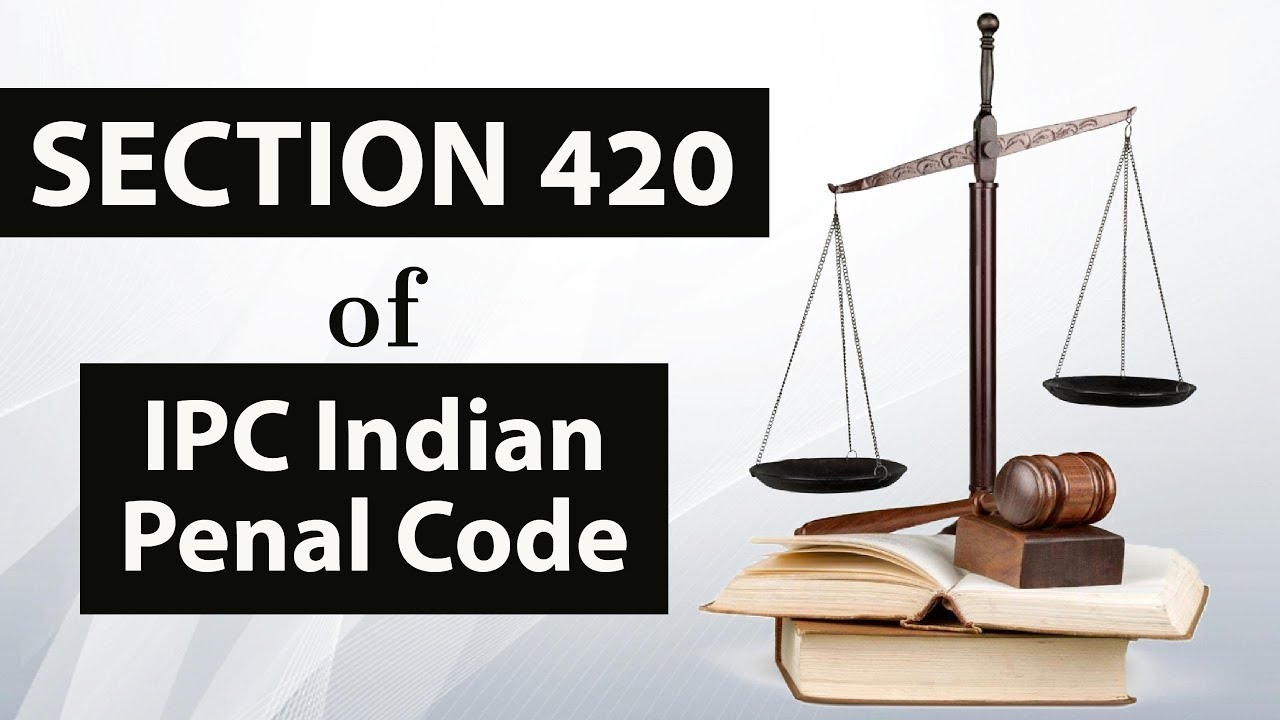Section 420 of IPC
Introduction
Section 420 of the Indian Penal Code, 1860 deals with cheating and dishonestly inducing the delivery of property. This provision is one of the most commonly invoked sections in cases of fraud, misrepresentation, and cheating.
This section punishes individuals who deceive another person and, through dishonesty, cause them to deliver property, valuables, or money or make alterations in legal contracts.
Legal Provisions Under Section 420 IPC
Section 420 – Text of the Law
"Whoever cheats and thereby dishonestly induces the person deceived to deliver any property to any person, or to make, alter, or destroy the whole or any part of a valuable security, or anything which is signed or sealed and capable of being converted into a valuable security, shall be punished with imprisonment of either description for a term which may extend to seven years, and shall also be liable to fine."
Essential Ingredients of Section 420 IPC
To constitute an offense under this section, the following elements must be present:
1. Cheating (Section 415 IPC) Must Be Proven
- Cheating is defined under Section 415 IPC, which means:
- Deception of a person.
- Fraudulently or dishonestly inducing them to deliver property or take actions they otherwise wouldn’t.
2. Dishonest Inducement
- The accused must have fraudulently or dishonestly induced another person.
- Mere breach of contract does not constitute cheating unless there was fraudulent intent from the beginning.
3. Delivery of Property or Alteration of Security
- The victim must have delivered property, money, or valuable security (e.g., cheques, bonds, agreements).
- If the fraud results in altering or destroying valuable legal documents, it also falls under this section.
4. Intention to Deceive from the Beginning
- The accused must have had dishonest intent at the time of making a promise or agreement.
Punishment for Section 420 IPC
- Imprisonment: Up to 7 years
- Fine: A fine may also be imposed
- Cognizable and Non-Bailable Offense:
- Cognizable: Police can arrest the accused without prior approval from the court.
- Non-Bailable: Bail is not automatically granted; the accused must apply for it in court.
- Triable by Magistrate of First Class
Examples of Offenses Under Section 420 IPC
-
Fraudulent Property Transactions:
- Selling a property without ownership rights or taking advance payment and absconding.
-
Cheque Bounce with Fraudulent Intent:
- Issuing a cheque without sufficient funds while knowing that the bank will reject it.
-
Online Fraud and Cyber Scams:
- Online job frauds, Ponzi schemes, fake lotteries, and phishing scams.
-
Fake Promises for Loans or Investments:
- Fraudulently inducing people to invest in fake schemes and disappearing with the money.
-
Forged Documents & Identity Fraud:
- Creating fake documents, degrees, or IDs to deceive others for financial gain.
Landmark Judgments on Section 420 IPC
1. S.W. Palanitkar vs State of Bihar (2002)
- The Supreme Court ruled that mere failure to fulfill a promise does not amount to cheating unless fraudulent intent existed at the time of making the promise.
2. Hridaya Ranjan Pd. Verma vs State of Bihar (2000)
- The SC clarified that a criminal breach of trust differs from cheating; cheating requires fraudulent intent at the beginning.
3. State of Maharashtra vs Tapan Kumar Singh (2003)
- The Court upheld that intention to deceive must be proven and cannot be assumed solely from non-fulfillment of a contract.
Defenses Available to the Accused
-
Lack of Fraudulent Intent:
- If the accused can prove they had genuine intentions at the time of making a promise, the case may not stand.
-
Civil vs Criminal Dispute:
- If the dispute is purely contractual (e.g., business disagreements), the case should be filed in a civil court rather than as a criminal case.
-
Absence of Inducement:
- If the accused did not actively induce the victim to part with money/property, Section 420 may not apply.
Difference Between Section 420 IPC and Other Fraud-Related Sections
| Section |
Description |
Punishment |
| Section 415 IPC |
Defines cheating |
Up to 1 year imprisonment or fine |
| Section 420 IPC |
Cheating & dishonestly inducing delivery of property |
Up to 7 years + fine |
| Section 406 IPC |
Criminal breach of trust |
Up to 3 years imprisonment or fine |
| Section 468 IPC |
Forgery for cheating |
Up to 7 years + fine |
| Section 471 IPC |
Using forged documents as genuine |
Same punishment as forgery offense |
How to File a Complaint Under Section 420 IPC?
-
File an FIR:
- A complaint must be lodged at the nearest police station under Section 154 CrPC.
-
Provide Evidence:
- Documents, transactions, email records, cheques, or any proof of fraudulent intent.
-
Police Investigation:
- The police will investigate, question the accused, and file a charge sheet if evidence is found.
-
Trial in Court:
- The accused will be prosecuted before a Magistrate of the First Class.
Conclusion
Section 420 IPC is a strong legal provision against fraud and cheating. However, not every contract dispute qualifies as cheating—there must be proof of dishonest intent from the beginning. Courts carefully examine evidence, intent, and inducement before convicting a person under this section.
